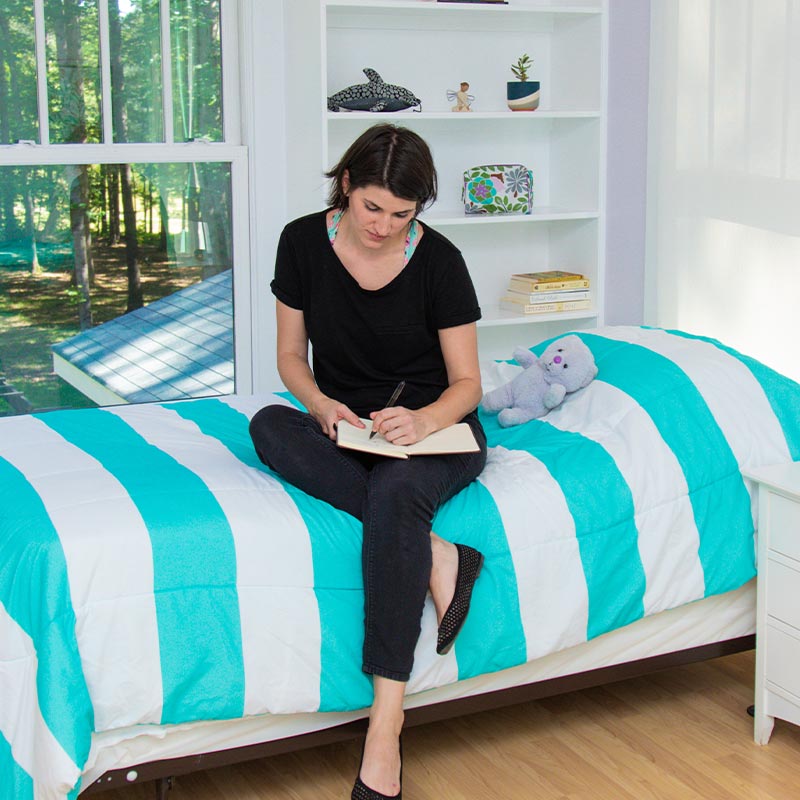Carolina House proudly serves people of all genders age 18 and older from across the country who are struggling with depression We are dedicated to providing comprehensive care and support to help individuals manage and overcome their depression.
Depression Treatment
Learn more about depression treatment at Carolina House in North Carolina
Depression, for instance, is one of the most common mental health conditions that people struggle with. Those who have depression will find that they are no longer able to maintain the lives they want for themselves. As a result, a series of physical and psychological consequences ranging from unpleasant to life-threatening can develop. Additionally, all aspects of an individual’s life can begin to deteriorate because of the presence of this condition. Thankfully, relief from this disorder can be found at professional treatment and rehab centers specializing in depression.
At Carolina House, located in North Carolina and also serving South Carolina and all states nationwide, we recognize how complex depression can be, and know that additional mental health conditions tend to co-occur alongside of it. Therefore, we work to provide both physical and psychological treatment and rehab to our clients to ensure that they develop a solidified recovery from their depression. At Carolina House, we can offer life-changing care at our treatment and rehab center that has allowed countless people of all genders to overcome their depressive symptoms. At our Durham, North Carolina location, we address these concerns through a comprehensive approach.
How to Help a Loved One
Helping a loved one get treatment for depression
Watching someone you love struggle with depression can be saddening, painful, and, at times, even frustrating. While your loved one continues to suffer from these conditions, you can begin feeling depleted yourself, as you have likely tried numerous different approaches to get them to obtain effective treatment and rehab at a professional center for depression. Despite feeling discouraged, it is imperative to understand that there are things that you can continuously be doing to help guide your loved one towards getting the correct treatment, including:
- Learning as much as you can about depression. Spend time educating yourself about what effects it can have on your loved one. The more information you have, the better equipped you will be in helping them.
- Researching some of the most regarded methods of treatment and rehab at centers for depression. Talk about those options with your loved one, and do not be afraid to reach out to a treatment and rehab center that specializes in depression to learn more.
- Letting your loved one know that you are there for them. Tell them that you will be happy to help set appointments at their chosen treatment and rehab center for depression, go to assessments, or help carry out other daily tasks so that they can focus on recovery.
When your loved one finally accepts treatment and rehab at a high-quality center, it is imperative that you continue to show your love and support to them so that the process of recovering is easier on them. Make sure that you continue to practice good self-care so you are able to do these things.
Why Consider Treatment
Why consider treatment for depression at Carolina House in North Carolina
Those who have primary depression can face a series of upsetting consequences. The effects of depression alone can include mood imbalances, fatigue, insomnia, and more. In some cases, these effects can be managed, but they may also have long-lasting impacts. All forms of depression can lead to severe outcomes. Additional symptoms such as suicidal tendencies, mood swings, and anger can also occur. The presence of these symptoms can be fatal, especially if they go untreated. Luckily, however, there are treatment options available for those battling depression. With proper treatment from a mental health rehab center like Carolina House, located in North Carolina and also serving South Carolina and all states nationwide, recovery is possible.
Types of Treatment
Types of depression treatment offered at Carolina House in North Carolina
Since 2006, we, at Carolina House, have been devoted to providing world-class, gender-inclusive residential treatment and rehab to those who are in need of comprehensive treatment to overcome the symptoms of depression. Situated in a serene, wooded setting, Carolina House offers clients of all genders age 18 and older a tranquil environment that is fully conducive to true and lasting healing. We hold ourselves to a standard of excellence in the care we deliver so that anyone who engages in treatment and rehab at our center for depression with us can succeed in discovering a renewed life of wellness.
At Carolina House, located in North Carolina and also serving South Carolina and all states nationwide, we have made it our goal to provide a beautiful, safe, and nurturing environment that is run by highly trained and supportive staff. We use a structured, multifaceted treatment approach that is designed to usher clients successfully into life-long recovery. Our treatment and rehab approach at our center depression also encourages self-exploration towards transformation through self-nurturing expressions of living. This goal and these treatment and rehab approaches are met by providing clients with individualized treatment plans that are catered to meet each of their very unique needs. Various aspects that may be incorporated into these treatment and rehab plans at our depression treatment center are described in the following:
Medication management: When individuals are battling symptoms of a mental health condition such as depression, the use of certain medications may be recommended in order to help alleviate some of their distress. Clients at our treatment and rehab center for depression have the opportunity to meet with a psychiatrist once or twice a week in order to determine the need for any medication, as well as to monitor the therapeutic effectiveness of any medication prescribed.
Individual therapy: Clients are provided with one full individual therapy session each week that typically lasts between 45 and 60 minutes. Additionally, clients will meet with their therapists for one or two brief check-in sessions each week, each of which may last anywhere between 20 and 40 minutes. These sessions are designed to provide clients with an opportunity to meet in a private, confidential setting with their therapists so that they can discuss their progress in treatment, process through any setbacks that may have arisen, and celebrate any successes that have occurred while in treatment and rehab for depression at our center.
Family therapy: Recognizing how important family involvement can be in our clients’ successful recovery from depression, the staff at Carolina House, located in North Carolina and also serving South Carolina and all states nationwide, frequently incorporates family therapy into our clients’ treatment plans. Family therapy sessions are typically offered on a weekly basis, meeting for an average of 45 to 60 minutes for each session. If deemed appropriate and therapeutically beneficial to clients, additional family sessions may be added on an as needed basis.
Group therapy: When working to overcome depression, group therapy sessions have proven to be incredibly beneficial and effective. Clients typically participate in an average of six group therapy sessions each weekday, four group sessions on Saturdays, and two group sessions on Sundays. These group therapy sessions are typically broken down as follows:
- Dialectical Behavior Therapy (DBT) Groups take place three times per week and are facilitated by a licensed clinical social worker who is specially trained in DBT.
- Two Food and Feeling Groups take place every day. These are short, skills identification groups that occur after every lunch or dinner.
- Interpersonal Process Groups occur three times per week and are dually led by a licensed professional counselors and other qualified professionals who have been fully trained in the group modality.
- A variety of other groups occur during the week as well, including both process and psychoeducational groups. The topics that are covered during these sessions vary but may include discussions on body image, media awareness, empowerment, relapse prevention, nutrition, and guided self-care, among many others.
- Two Integrated Health Groups take place each week and are led by a licensed clinical specialist and are attended by all clients. Weekly offsite meetings are also made available to clients who need them.
Experiential therapy: In order to offer clients a holistic approach to the treatment, Carolina House offers a number of experiential therapy options at our depression treatment and rehab center in addition to the more traditional therapeutic interventions. Examples of these therapies include the following:
- Yoga therapy
- Walks
- Art therapy
- Culinary Group
- Strength training
- Embodying Recovery (a sensorimotor psychotherapy group)
- Games
- Body movement activities
Additionally, keeping in mind that recovery is an ongoing process, the staff at Carolina House is dedicated to ensuring that clients have a definitive plan set in place prior to their being discharged. From the time of admission to our treatment and rehab center for depression, clients’ primary therapists are assessing their outside resources and determining what services need to be in place in order to support a smooth discharge plan. Typically, the goal will be to step down to a lower level of care slowly so that clients can be fully prepared for increased independence.
If you or a loved one is suffering from depression, the staff at Carolina House wants to help. Located in North Carolina and also serving South Carolina and all states nationwide, our world-class programming at Carolina House can help you overcome the symptoms that plague you, while also assisting you as you develop the confidence needed to embark on a bright and promising future. Do not continue to suffer. Let the staff at Carolina House show you that there’s a better way to live.











